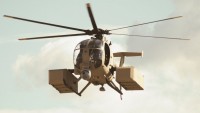DARPA Making Good Progress in Developing ‘Robotic Co-Pilots’ for US Warplanes
| Arthur Dominic Villasanta | | Nov 10, 2016 11:25 PM EST |
(Photo : DARPA) ALIAS program from DARPA (concept).
The U.S. Defense Advanced Research Projects Agency (DARPA) reports significant progress in a program to develop smart robotic co-pilots that will eventually pilot a host of U.S. military aircraft in the future.
DARPA said it's made notable progress on two different concepts for robotic copilots that are part of its program called ALIAS (Aircrew Labor In-Cockpit Automation System) that will autonomously operate aircraft and also offer advice to a human pilot.
Like Us on Facebook
ALIAS envisions a custom, drop-in, removable kit that will promote the addition of high levels of automation into existing aircraft, enabling operation with reduced onboard crew.
The program intends to exploit the considerable advances made in aircraft automation systems over the past 50 years, and similar advances in remotely piloted aircraft automation, to help reduce pilot workload, augment mission performance and improve aircraft safety.
As an automation system, ALIAS aims to support execution of an entire mission from takeoff to landing, even in the face of contingency events such as aircraft system failures.
ALIAS system attributes such as persistent-state monitoring and rapid recall of flight procedures will further enhance flight safety. Easy-to-use touch and voice interfaces will facilitate supervisor-ALIAS interaction.
ALIAS will also provide a platform for integrating additional automation or autonomy capabilities tailored for specific missions.
The two defense contractors developing these robotic co-piloting systems, Aurora Flight Sciences and Sikorksy, conducted a series of flight demonstrations in October ahead of a federal government decision to select a single vendor for the program's third and final phase.
The impetus behind the ALIAS program is to develop a system that can reduce the number of crew onboard manned aircraft, going "from two pilots down to one, and then possibly down to zero," explained Jean Charles-Lede, program manager of DARPA's tactical technology program office, during a recent briefing.
The companies were challenged to develop an ALIAS system that can be integrated with at least 80 percent of Department of Defense aircraft, including older models that lack the all-digital cockpits and fly-by-wire technology of modern planes and helicopters, said Jessica Duda, Aurora's ALIAS program manager.
TagsDefense Advanced Research Projects Agency, DARPA, alias, Aircrew Labor In-Cockpit Automation System
©2015 Chinatopix All rights reserved. Do not reproduce without permission
 New DARPA Project Intends to Neutralize Effectiveness of Digitally Programmable Radars
New DARPA Project Intends to Neutralize Effectiveness of Digitally Programmable Radars DARPA Robot Submarine Killer Warship called ACTUV gets a ‘Spy in the Sky’
DARPA Robot Submarine Killer Warship called ACTUV gets a ‘Spy in the Sky’ First DIUx Contracts will Develop Smarter Land, Sea and Aerial Drones
First DIUx Contracts will Develop Smarter Land, Sea and Aerial Drones DARPA Developing Windowless APC so Soldiers Inside can See Better
DARPA Developing Windowless APC so Soldiers Inside can See Better DARPA has Just Developed Hack Proof Code and Proved it Works
DARPA has Just Developed Hack Proof Code and Proved it Works
EDITOR'S PICKS
-

Did the Trump administration just announce plans for a trade war with ‘hostile’ China and Russia?
-

US Senate passes Taiwan travel bill slammed by China
-

As Yan Sihong’s family grieves, here are other Chinese students who went missing abroad. Some have never been found
-

Beijing blasts Western critics who ‘smear China’ with the term sharp power
-

China Envoy Seeks to Defuse Tensions With U.S. as a Trade War Brews
-

Singapore's Deputy PM Provides Bitcoin Vote of Confidence Amid China's Blanket Bans
-

China warns investors over risks in overseas virtual currency trading
-

Chinese government most trustworthy: survey
-

Kashima Antlers On Course For Back-To-Back Titles
MOST POPULAR
LATEST NEWS
Zhou Yongkang: China's Former Security Chief Sentenced to Life in Prison

China's former Chief of the Ministry of Public Security, Zhou Yongkang, has been given a life sentence after he was found guilty of abusing his office, bribery and deliberately ... Full Article
TRENDING STORY

China Pork Prices Expected to Stabilize As The Supplies Recover

Elephone P9000 Smartphone is now on Sale on Amazon India

There's a Big Chance Cliffhangers Won't Still Be Resolved When Grey's Anatomy Season 13 Returns

Supreme Court Ruled on Samsung vs Apple Dispute for Patent Infringement

Microsoft Surface Pro 5 Rumors and Release Date: What is the Latest?










